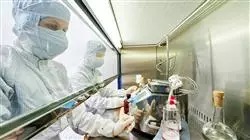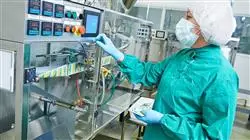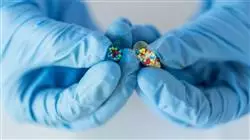University certificate
The world's largest faculty of pharmacy”
Why study at TECH?
The Postgraduate diploma in Elaboration of Individualized Oral Medicines contains the most complete and up to date scientific program on the market"

Industrialized medicine has been a breakthrough in current therapeutics, since many patients have found a remedy for their illnesses.
However, this industrialized drug does not cover all therapeutic needs. For various reasons, there are therapeutic gaps that only the Individualized Medicine can fill.
The Master Formulation or, nowadays, "individualized medicine" is the essence of the pharmaceutical profession. It has been the starting point of human medicine therapeutics, when patient care was individualized.
The master formula, understood as the medicine intended for an individualized patient, prepared by or under the direction of a pharmacist, to expressly comply with a detailed medical prescription of the medicinal substances it includes, requires that the professional activity be adjusted to strict and faithfully reproducible procedural guidelines. In this sense, pharmacists need to be updated and promote continuous training in the knowledge and compliance with the standards for the correct preparation and quality control of master formulas in order to achieve the required level of quality.
The objective of this program is to train pharmacists in a discipline unique and exclusive to their profession, training professionals who can respond to therapeutic gaps with the formulation of an individualized drug with the quality and efficacy of an industrialized drug.
This Postgraduate diploma may be the best investment you can make in the selection of a refresher program for two reasons: in addition to updating your knowledge in the elaboration and development of individualized drugs of oraladministration, you will obtain a Postgraduate diploma from TECH Global University"
This Postgraduate diploma in Elaboration of Individualized Oral Medicines contains the most complete and up to date scientific program on the market. The most important features of the program include:
- Clinical cases presented by experts in the different specialties. The graphic, schematic, and eminently practical contents of which they are composed provide scientific and practical information on the disciplines that are essential for professional practice.
- What's new in the development of individualized oral medications?
- Algorithm-based interactive learning system for decision-making in the presented clinical situations.
- With a special emphasis on evidence-based medicine and research methodologies in Elaboration of Individualized Oral Medicines.
- All this will be complemented by theoretical lessons, questions to the expert, debate forums on controversial topics, and individual reflection assignments.
- Content that is accessible from any fixed or portable device with an Internet connection.
Increase your confidence in decision making by updating your knowledge through this Postgraduate Diploma in Elaboration of Individualized Oral Medicines"
Its teaching staff includes health professionals belonging to the field of pharmacology, who bring to this training the experience of their work, in addition to recognized specialists belonging to leading scientific societies.
The multimedia content developed with the latest educational technology will provide the professional with situated and contextual learning, i.e., a simulated environment that will provide an immersive training program to train in real situations.
This program is designed around Problem Based Learning, whereby the physician must try to solve the different professional practice situations that arise during the course. This will be done with the help of an innovative interactive video system developed by renowned experts in the field of pharmacology with extensive teaching experience.

Don't miss the opportunity to update your knowledge in Elaboration of Individualized Oral Medicines to improve patient care"
Syllabus
The structure of the contents has been designed by a team of professionals knowledgeable about the implications of training in daily pharmaceutical practice, aware of the relevance of current training in order to develop individualized dosage forms in a safe and efficient manner and committed to quality teaching through new educational technologies.

This Postgraduate diploma in Elaboration of Individualized Oral Medicines contains the most complete and updated scientific program on the market"
Module 1. Application of the Quality Assurance and Quality Control System for Master Formulas and Office Preparations. R.D.175/2001
1.1. Standards of Correct Elaboration and Quality Control
1.1.1. Quality Management Systems
1.1.2. Personal
1.1.2.1. Responsibilities
1.1.2.2. Training
1.1.2.3. Hygiene
1.1.3. Premises and Tools
1.1.3.1. General Characteristics of the Premises
1.1.3.2. General Equipment Characteristics
1.1.3.2.1. General Equipment
1.1.3.2.2. Specific Equipment
1.1.4. Documentation
1.1.4.1. General Documentation
1.1.4.2. Documentation related to Raw Materials
1.1.4.3. Packaging Material Documentation
1.1.4.4. Documentation related to Master Formulas and Official Preparations
1.1.5. Raw Materials and Packaging Material
1.1.5.1. Origin
1.1.5.1.1. Raw Materials Acquired from an Authorized Center
1.1.5.1.2. Raw Materials Acquired from Other Entities
1.1.5.1.3. Raw Materials Centralized by the Administration
1.1.5.1.4. Packaging Material
1.1.5.1.4.1. Glass
1.1.5.1.4.2. Plastic
1.1.5.1.4.2.1. PVC
1.1.5.1.4.2.2. PET
1.1.5.1.4.2.3. PP
1.1.5.1.4.2.4. PE
1.1.5.2. Reception and Quarantine
1.1.5.3. Conformity Control
1.1.5.4. Documentation
1.1.6. Production
1.1.6.1. Production by Third Parties
1.1.7. Dispensing and Labeling
1.1.7.1. Patient Information
1.1.7.2. Labelling
1.2. General Procedures
1.2.1. Introduction
1.2.2. Objectives
1.2.3. General Procedures
1.2.3.1. PG for Internal Documentation Management
1.2.3.2. GP for the Development of Procedures
1.2.3.3. GP for Managing Records
1.2.3.4. PG for Cleaning and Disinfection Premises and Equipment
1.2.3.5. GP for Personnel Hygiene and Clothing
1.2.3.6. GP of Subcontracting
1.2.3.7. GP of Shopping
1.2.3.8. GP for Product Storage, Conservation and Disposal
1.2.3.9. GP for Team Management
1.2.3.10. GP for Toration and Qualification
1.2.3.11. GP for the Study, Elaboration and Dispensing of Master Formulas and Office Preparations
1.2.3.12. GP for the Labeling and Dispensing of Master Formulas and Office Preparations
1.3. Development of Standard Operating Procedures
1.3.1. Weighing Work SOPs
1.3.2. Powder Mixing and Production SOPs
1.3.3. Disaggregation SOPs
1.3.4. SOPs for the Manufacture of Hard Gelatin Capsules
1.3.5. SOP for the Production of Gastroresistant Capsules
1.3.6. SOPs for Gel Production
1.3.7. SOPs for Solutions Production
1.3.8. SOPs for Ointment and Paste Production
1.3.9. SOPs for Emulsions Production
1.3.10. SOPs for Suspensions Production
1.3.11. SOPs for the Production of Paper Rolls
1.3.12. SOPs for Sterile Preparations
Module 2. Biopharmaceutics and Pharmacokinetics
2.1. New Aspects of Galenic Pharmacy
2.1.1. Introduction
2.1.2. Chemical, Therapeutic and Biological Equivalence of Medicines
2.1.3. Biopharmaceutics and Basic Pharmacokinetics
2.1.4. Pharmaceutic Technology
2.1.5. Clinical Pharmacokinetics
2.2. Evolution of Medicines in the Body
2.2.1. LADME
2.2.2. Kinetics of LADME Processes
2.2.3. Release as a Limiting Factor for Absorption
2.3. Absorption Mechanisms
2.3.1. Passive Diffusion
2.3.2. Convective Diffusion
2.3.3. Active Transport
2.3.4. Facilitated Transport
2.3.5. Ion Pairs
2.3.6. Pinocytosis
2.4. Routes of Administration
2.4.1. Oral Route
2.4.1.1. Physiological Factors Affecting Gastrointestinal Absorption
2.4.1.2. Physicochemical Factors that Limit Absorption
2.4.2. Topical Route
2.4.2.1. Structure of the Skin
2.4.2.2. Factors Influencing the Absorption of Substances Through the Skin
2.4.2.3. Parenteral Route
2.4.2.3.1. Parenteral Aqueous Solutions
2.4.2.3.2. Delayed Parenteral Solutions
Module 3. Basic Operations in the Production of Individualized Formulas
3.1. Weighing
3.1.1. Objective
3.1.2. Scales
3.1.2.1. Calibration
3.2. Spraying
3.2.1. Importance in the Formulation and Objectives
3.2.2. Spraying Equipment
3.2.1.1. Manual
3.2.1.2. Industrial
3.2.3. Factors that Affect Spraying
3.2.3.1. Size
3.2.3.2. Texture
3.2.4. Rheological Properties
3.2.4.1. Plastics
3.2.4.2. Exfoliables
3.2.4.3. Elastic
3.3. Screening
3.3.1. Description
3.3.2. Sieves
3.3.3. Sieving Procedures
3.4. Mixing and Homogenization
3.4.1. Objectives
3.4.2. Types of Mixtures
3.4.3. Homogenization Process
3.4.4. Mixing Equipment
3.5. Filtration
3.5.1. Concept
3.5.2. Filtration Systems
3.5.3. Modes of Filtration
3.5.3.1. Conventional Filtration
3.5.3.2. Microfiltration
3.5.3.3. Ultrafiltration
3.5.3.4. Reverse Osmosis
3.5.3.5. Sterilizing Filtration
3.5.3.6. Tangential Filtration
3.6. Drying
3.6.1. Types of Sounds According to their Humidity
3.6.2. Midwives in Drying
3.6.3. The Drying Process
3.6.4. Devices for Drying
3.6.5. Freeze-Drying
3.6.3.1. Stages of the Freeze-drying Process
3.6.3.2. Applications
3.7. Sterilization
3.7.1. Heat Sterilization
3.7.1.1. Humid Heat
3.7.1.2. Dry Heat
3.7.2. Sterilization by Filtration
3.7.3. Other Types of Sterilization
Module 4. Liquid Dosage Forms for Oral Administration
4.1. Oral Solutions
4.1.1. Solubility and Factors Involved in this Process
4.1.2. Solvents
4.1.3. Production
4.1.4. Quality Control
4.1.5. Potential Problems in Production
4.2. Suspensions and Syrups
4.2.1. Important Aspects
4.2.2. Production
4.2.3. Quality Control
4.3. Sachets
4.3.1. Production
4.4. Application of Liquid Oral Dosage forms in Pediatrics
4.4.1. Common Pathologies
4.4.2. Common Master Formulas
4.5. Application of Liquid Oral Dosage Forms in Geriatrics
4.5.1. Common Pathologies
4.5.2. Common Master Formulas
Module 5. Solid Dosage Forms for Oral Administration
5.1. Capsules
5.1.1. Definition and General Aspects
5.1.2. Types
5.1.2.1. Hard Gelatin Capsules
5.1.2.2. Soft Gelatin Capsules
5.1.2.3. Gastroresistant Capsules
5.1.3. Production of Capsules
5.1.4. Excipients Capsules
5.2. Tablets I
5.2.1. Definition
5.2.2. Types
5.2.3. Advantages and Disadvantages
5.2.4. Preformulation and Property Analysis
5.2.5. Flow Properties
5.2.6. Formulation
5.2.6.1. Types of Excipients
5.2.6.1.1. Diluents
5.2.6.1.2. Binders
5.2.6.1.3. Disintegrants
5.2.6.1.4. Lubricants
5.2.6.2. Direct Compression Excipients
5.2.6.2.1. Cellulose Derivatives
5.2.6.2.2. Starch Derivatives
5.2.6.2.3. Sugars
5.2.6.2.4. Mineral Products
5.2.7. Compression Methods
5.2.7.1. Wet Granulation
5.2.7.1.1. Advantages and Disadvantages
5.2.7.1.2. Granulation and Compression Process
5.2.7.2. Dry Granulation
5.2.7.2.1. Advantages and Disadvantages
5.2.7.2.2. Features
5.2.7.3. Direct Compression
5.2.7.3.1. Advantages and Disadvantages
5.2.7.3.2. Compression Process
5.2.8. Quality Control
5.2.9. Compression Machines
5.2.9.1 Types
5.2.9.1.1. Eccentric Compression Machines
5.2.9.1.2. Rotary Compression Machines
5.3. Tablets II

A unique, key, and decisive training experience to boost your professional development”
Postgraduate Diploma in Elaboration of Individualized Oral Medicines
The pharmaceutical industry is one of the largest sectors worldwide, its productivity has increased to such an extent that, at present, it generates revenues of about 1.3 trillion dollars. Thanks to its massive production, nowadays it is possible to treat different conditions through the use of singularized drugs (pills, topical creams and liquids). Being an area in constant growth that demands highly trained professionals, TECH Global University developed a Postgraduate Diploma in Elaboration of Individualized Oral Medicines, focused on the correct development of magistral formulas and officinal preparations according to the current regulations and legislation for the execution of these procedures. The main objective of this program is to train pharmacists in a discipline that requires unique skills to successfully develop prescriptions. In the syllabus of this program taught in virtual mode, our students will find key topics ranging from the principles of biopharmacy and clinical pharmacokinetics, to the management of chemical, therapeutic and biological equivalence of a drug. In addition, they will learn the procedural guidelines used for the preparation and quality control of these formulas, which involves knowledge of medical prescription to detail the medicinal substances included.
Specialize in developing individualized oral medications
Throughout 400 hours of preparation at the largest Faculty of Pharmacy, you will strengthen your knowledge by knowing and defining the factors that influence the realization of pharmaceutical forms. You will specialize in designing magistral formulas and officinal preparations in doses indicated for therapeutic treatments in both pediatric and geriatric populations. In addition, you will learn about different aspects that vary from the active ingredients for each of the pharmaceutical prescriptions, the handling of the utilaje and measurement systems; to the elaboration of oral solutions (suspensions and syrups) based on their respective quality control. Next, you will learn about solubility and factors involved in the process of liquid preparations (filtration systems, microfiltration, ultrafiltration), the basic principles of packaging, the registration of raw materials and the application of parenteral or delayed parenteral aqueous solutions. From this, you will be able to prepare explanatory reports describing the indications of each pharmaceutical prescription, in order to analyze the physiological factors influencing the gastrointestinal absorption of each formulation.







